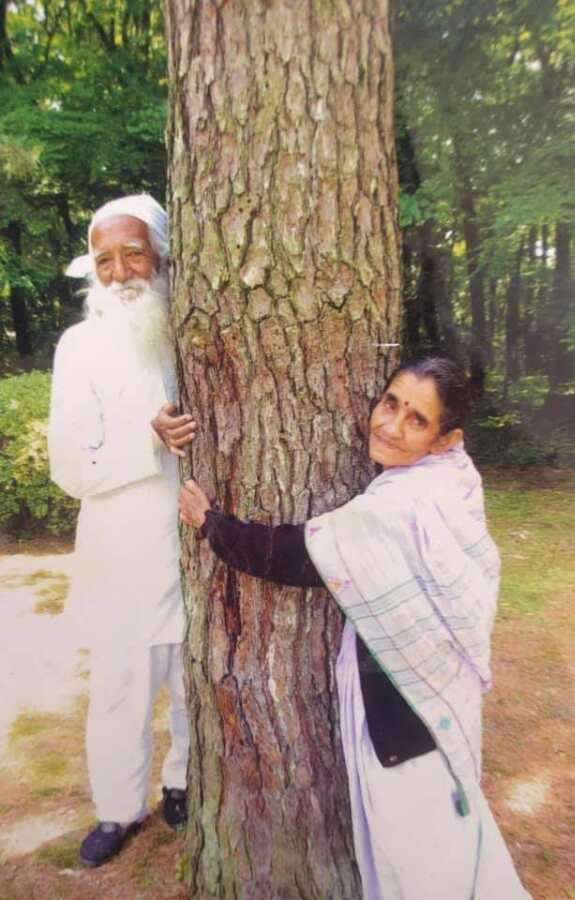Bidding adieu
Demise of Sunderlal Bahuguna is an irreparable loss; his selfless service to Mother Earth will continue inspiring generations

The pandemic has taken away yet another prominent figure of the country. Sunderlal Bahuguna aged 94; the world-famous environmentalist breathed his last on May 21, 2021, at the Rishikesh All India Institute of Medical Sciences where he was admitted for the Covid treatment. He was a legend and his death is a great loss to the entire world, particularly the people of the Himalayan region. He was the 'original environmentalist' of the world and through the sheer dent of humility and dogged determination, he changed the way governments functioned in India and elsewhere. The subject of forest and environment conservation gained prominence only after the Chipko (means hugging the trees) movement, which was started in the early seventies in Uttarakhand by him and another environmentalist, Chandi Prasad Bhatt. The Chipko movement was started in 1974 against the felling of trees by the forest department and, as a result, people stopped felling of trees by the contractors by hugging the trees. He was not a run of the mill agitator seeking funds for his work but a sane person of high intellectual calibre and vision who had set standards of simplicity in living and was grounded to the reality that pervades rural India in all its reflection of the socio-economic scenario that we see in rural poor struggling to make their ends meet.
Sunderlal Bahuguna was a multidimensional personality; born in Marora village in Tehri Garhwal District of Uttarakhand on January 9, 1927, in a fairly well-to-do family of the princely Tehri state. He was the disciple of freedom fighter of Tehri kingdom, Sri Dev Suman, who ended his life after 84-day hunger strike against the king's corrupt officer's atrocities against the freedom fighters. The movement ultimately dethroned the king and the Tehri state became a district of Uttar Pradesh in 1949. Sunderlal did his Masters from Lahore and jumped into the freedom movement. Mrs Vimla, an emerging social activist in Tehri, married him and convinced him to adopt the Gandhian way of serving people rather than doing party politics. He joined the Sarvodaya movement of Vinoba Bhave. Though his family suffered a lot of hardship, the couple did not budge from their path and the rest is history. My mother, who was his first cousin, used to narrate the inspiring stories of this couple's frugal ways of living and working for the people in backward areas of Uttarakhand under tiring circumstances. From the penance of Sarvodaya was born the original environmental crusader who changed how the world perceived nature. The legal framework we see today in India and elsewhere is partly due to such selfless people of deep commitment. He made his Ashram at Silyara village in Tehri and created an example of self-sustained village life.
Sunderlal Bahuguna initially organized the forest labourers of Uttarakhand and, in this process, found the roads to his vision for the Chipko movement and soon after started moving to other parts of India to mobilize the youth to create awareness. Among his notable achievements was sitting on a hunger strike in the mid-seventies against the felling of trees in the higher Himalayas. The Central and state governments were forced to announce a complete ban on green fellings in Himalayan states based on a working plan and thus the focus shifted on conservation. He coined the slogan "Ecology is permanent economy" and soon became a household name with his 5,000-km Trans-Himalayan foot march. Besides this, he, on foot, travelled more than 4000 km all over India to see the adverse impacts of developmental projects on the environment and forests.
Apart from being an environmentalist, he was a social reformer. He convinced many to opt for simple marriage ceremonies and stop dowry. He led a big movement in the 1980s against the liquor policy of the government in Uttarakhand hills and sat for a hunger strike for a very long period and ultimately the government declared prohibition in hill districts.
He opposed the 2000-Megawatt Tehri Hydro project fiercely and was the supporter of a small run of the river projects. He sat on hunger strike against the project twice; first in 1995 for more than 45 days when the then Prime Minister agreed to constitute an expert group which did not help him much and, again, he sat on a 74-day hunger strike in 1997 but nothing could be sorted out despite the then Prime Minister assuring him. He again sat on a hunger strike in 2001 near the bank of Bhagirathi and, ultimately, he was arrested and the project was completed.
During a meeting in 2003, I had informed him that no government would back out when 90 per cent of the work has been completed and families have been rehabilitated. The issue of Tehri Dam was perhaps his only intervention that did not succeed. Had it had been opposed in the late sixties, things would have been different.
Sunderlal Bahuguna's life is an example of selfless devotion to the cause of Mother Nature. He had left a legacy for us to cherish the cause for which he lived. He had become a living legend in his lifetime. His brilliance and foresight had no match. He was awarded the 'Alternative Noble Prize' and the Padma Shri, which he turned down. Later on, he was honoured with Padma Vibhushan and other awards. The vacuum created by his death is difficult to fill. Today, the entire world mourns the demise of this great son of India. Rest in peace and thank you for coming to rescue nature.
The writer is the Chairman of Centre for Resource Management and Environment. Views expressed are personal



